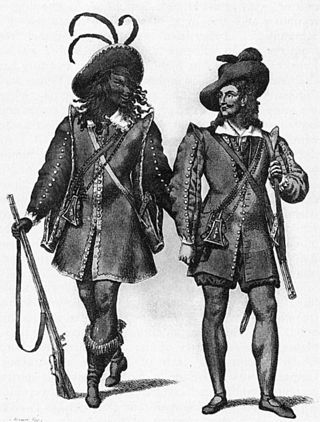
Der Freischütz is a German opera with spoken dialogue in three acts by Carl Maria von Weber with a libretto by Friedrich Kind, based on a story by Johann August Apel and Friedrich Laun from their 1810 collection Gespensterbuch. It premiered on 18 June 1821 at the Schauspielhaus Berlin. It is considered the first German Romantic opera.

Francesco Gasparini was an Italian Baroque composer and teacher whose works were performed throughout Italy, and also on occasion in Germany and England.

Macbeth is an opera in four acts by Giuseppe Verdi, with an Italian libretto by Francesco Maria Piave and additions by Andrea Maffei, based on William Shakespeare's play of the same name. Written for the Teatro della Pergola in Florence, Macbeth was Verdi's tenth opera and premiered on 14 March 1847. It was the first Shakespeare play that Verdi adapted for the operatic stage. Almost twenty years later, Macbeth was revised and expanded into a French version and given in Paris on 21 April 1865.

Otello is an opera in three acts by Gioachino Rossini to an Italian libretto by Francesco Berio di Salsa after William Shakespeare's play Othello, or The Moor of Venice; it was premiered in Naples, Teatro del Fondo, 4 December 1816.

Faramondo, HWV 39, is an opera in three acts by George Frideric Handel to an Italian libretto adapted from Apostolo Zeno's Faramondo. The story is loosely based upon the legend of Pharamond, a mythological King of the Franks, circa 420 AD, and the early history of France. The opera had its first performance at the King's Theatre, London, on 3 January 1738.
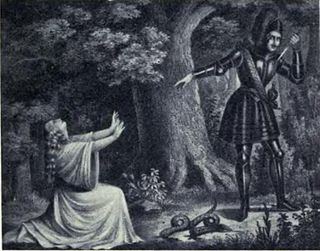
Euryanthe is a German grand heroic-romantic opera by Carl Maria von Weber, first performed at the Theater am Kärntnertor in Vienna on 25 October 1823. Though acknowledged as one of Weber's most important operas, the work is rarely staged because of the weak libretto by Helmina von Chézy. Euryanthe is based on the 13th-century French romance L'Histoire du très-noble et chevalereux prince Gérard, comte de Nevers et la très-virtueuse et très chaste princesse Euriant de Savoye, sa mye.
Domenico Fischietti (1725–1810) was an Italian composer.
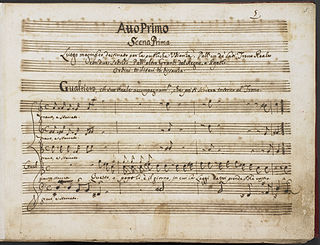
Griselda is an opera seria in three acts by the Italian composer Alessandro Scarlatti, the last of Scarlatti’s operas to survive completely today. The libretto is by Apostolo Zeno, with revisions by an anonymous author. Zeno wrote his work in 1701 and it had already been set by Pollarolo and Antonio Maria Bononcini. It is based on the story of Patient Griselda from Boccaccio's tenth day of The Decameron. Scarlatti's opera was first performed at the Teatro Capranica, Rome, in January 1721 with an all-male cast.

Catone in Utica is an opera libretto by Metastasio, that was originally written for Leonardo Vinci's 1727 opera. Following Vinci's success, Metastasio's text was used by numerous composers of the baroque and classical eras for their own operas, including Pietro Torri (1736), Antonio Vivaldi (1737), Giovanni Battista Ferrandini (1753) and J. C. Bach (1761).

Giuseppe Maria Orlandini was an Italian baroque composer particularly known for his more than 40 operas and intermezzos. Highly regarded by music historians of his day like Francesco Saverio Quadrio, Jean-Benjamin de La Borde and Charles Burney, Orlandini, along with Vivaldi, is considered one of the major creators of the new style of opera that dominated the second decade of the 18th century.

Il prigionier superbo is an opera seria in three acts, composed by Giovanni Battista Pergolesi to a libretto attributed to Gennaro Antonio Federico, and based on an earlier libretto by Francesco Silvani for Gasparini's opera, La fede tradita e vendicata. It was premiered at the Teatro San Bartolomeo in Naples on 5 September 1733 and received further performances in October. The opera, with its labyrinthine plot involving the rivalry of Metalce and Viridate for the hand of Rosmene, soon sank into oblivion, but its comic intermezzo, La serva padrona was to achieve considerable success when performed on its own.

Seleuco, re di Siria is an opera seria in three acts by Francesco Bianchi. The libretto was by Mattia Botturini, after Antioco by Apostolo Zeno and Pietro Pariati, a libretto first set by Francesco Gasparini in 1705.
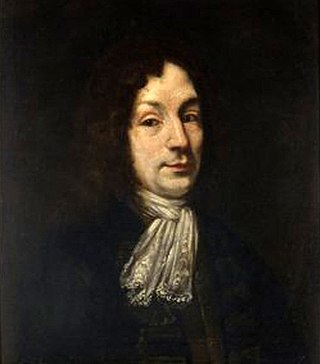
Luca Antonio Predieri was an Italian composer and violinist. A member of a prominent family of musicians, Predieri was born in Bologna and was active there from 1704. In 1737 he moved to Vienna, eventually becoming Kapellmeister to the imperial Habsburg court in 1741, a post he held for ten years. In 1765 he returned to his native city where he died two years later at the age of 78. A prolific opera composer, he was also known for his sacred music and oratorios. Although his operas were largely forgotten by the end of his own lifetime and most of their scores lost, individual arias as well some of his sacred music are still performed and recorded.

Atenaide is an opera by Antonio Vivaldi to a revised edition of a 1709 libretto by Apostolo Zeno for Caldara. It was first performed at the Teatro della Pergola in Florence on 29 December 1728 for the 1729 Carnival season.

Sebastiano Biancardi, known by the pseudonym Domenico Lalli, was an Italian poet and librettist. Amongst the many libretti he produced, largely for the opera houses of Venice, were those for Vivaldi's Ottone in villa and Alessandro Scarlatti's Tigrane. A member of the Accademia degli Arcadi, he also wrote under his arcadian name "Ortanio". Lalli was born and raised in Naples as the adopted son of Fulvio Caracciolo but fled the city after being implicated in a bank fraud. After two years wandering about Italy in the company of Emanuele d'Astorga, he settled in Venice in 1710 and worked as the "house poet" of the Grimani family's theatres for the rest of his career. In addition to his stage works, Lalli published several volumes of poetry and a collection of biographies of the kings of Naples. He died in Venice at the age of 62.
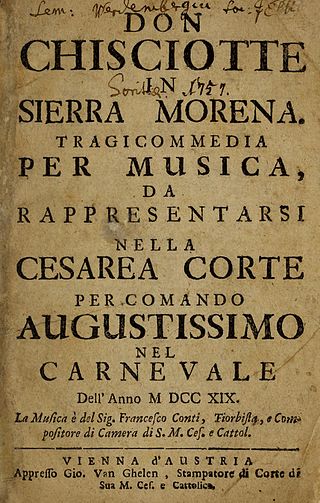
Don Chisciotte in Sierra Morena is a tragicomic opera in five acts composed by Francesco Bartolomeo Conti to an Italian libretto by Apostolo Zeno and Pietro Pariati. The libretto is based on the episodes set in the Sierra Morena mountains of Spain in Book I of the Miguel de Cervantes novel Don Quixote. The opera premiered on 6 February 1719 at the Hoftheater in Vienna and proved to be one of Conti's most successful ones. It has had several revivals in modern times beginning in 1987 at the Buxton Festival.

Bajazet is an opera by Francesco Gasparini, a revision of his 1711 work Tamerlano. It was first performed at the Teatro Pubblico in Reggio Emilia in 1719, with designs by Pietro Righini.
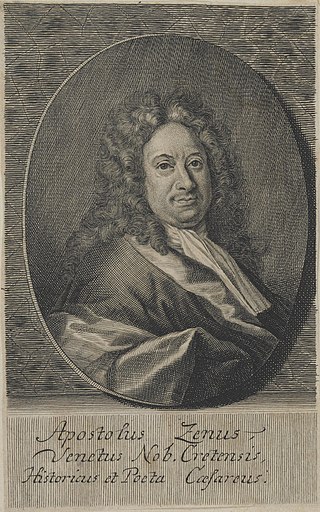
Temistocle is an opera in three acts composed by Nicola Porpora to an Italian libretto by Apostolo Zeno. It was first performed at the Hoftheater in Vienna on 1 October 1718. It is possibly the same opera that was performed on 30 May 1756 at the Teatre de la Santa Creu, Barcelona.

Sesostri re di Egitto is a three-act melodramma/opera composed by Italian composer Antonio Maria Bononcini in 1716, composed for seven voices and a seven-instrument orchestra. The Italian language libretto, written by Apostolo Zeno and Pietro Pariati, was published the same year in Milan by publisher Marc'Antonio Pandolfo Malatesta. The work premiered at the Teatro Regio Ducale on February 2, 1716. The opera is dedicated to Prince Eugene of Savoy and Piedmont, and tells the story about the mythical king Sesostris of Egypt.




















